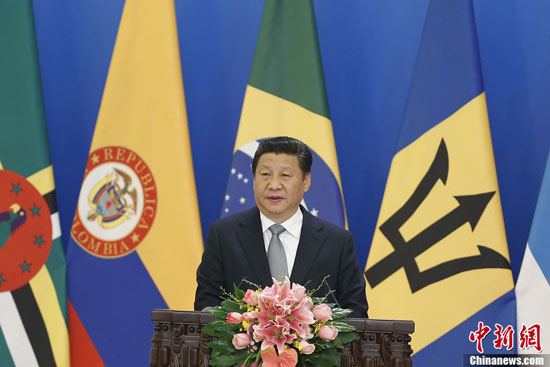Blossoming partnerships
- By An Gang
 0 Comment(s)
0 Comment(s) Print
Print E-mail Beijing Reivew, January 28, 2015
E-mail Beijing Reivew, January 28, 2015
|
|
|
President Xi Jinping delivers keynote speech at opening ceremony of 1st ministerial meeting of China-CELAC Forum on Jan. 8, 2015. [Chinanews.com] |
In the past two years, China put forward and made a full-fledged push for the "One Belt and One Road Initiatives" (The Silk Road Economic Belt and the 21st Century Maritime Silk Road) and Free Trade Area of the Asia-Pacific strategy. In the meantime, China also proposed and initiated the establishment of the Asian Infrastructure Investment Bank, BRICS Development Bank as well as the Silk Road Fund. These initiatives have laid a foundation for China's global partnership network and largely benefited developing countries. The latest outcome of China's global partnership strategy is the establishment of the Forum of China and the Community of Latin American and Caribbean States (CELAC). The two sides jointly announced the establishment of the China-CELAC Forum during President Xi's visit to Latin America last July, and its first ministerial meeting was held in Beijing on January 8-9.
Diplomats and scholars in the United States are carefully watching the recent development of the China-Latin America partnership, which has sparked heated debate regarding "why China and Latin America are tying the knot." Kevin Gallagher, Associate Professor of Global Development Policy at Boston University, expects that this January's Latin American powwow in Beijing will be a "pivot point for China-Latin America relations" that will most likely produce a "major set of funding arrangements." "It is hard to think about substantive counteroffers that the U.S. can provide," said Gallagher.
Big-power relations
Big-power relations comprise another important platform for China's partnership diplomacy. China develops partnerships with major world powers and conducts multi-level partnership cooperation with all countries, aimed at promoting a more balanced and reasonable direction for the international system.
On May 20, 2014, during the Fourth Conference on Interaction and Confidence Building Measures in Asia (CICA), President Xi signed a joint statement with Russian President Vladimir Putin that agreed to step up the China-Russia all-round strategic partnership to a higher level. China and Russia are neighboring super powers, the combined size of which constitute three fifths of the total area of Eurasia. The strengthening of their collaboration and mutual support on the basis of common ground is of great significance, especially at a time when each country is faced with geopolitical pressures.
In April 2014, China and the EU for the first time released a joint statement on enhancing the China-EU comprehensive strategic partnership featuring growth, reform and civilization. Five months later, China and India agreed to establish a closer partnership for development to promote their cooperation at bilateral, regional and global levels.
Ever since Beijing and Washington established official relations in the late 1970s, China has attempted several times to build a strategic partnership with the United States. But due to the differences in terms of ideology and strategic interests between the two, China's efforts have met with no results. Washington does not think it can be a "comprehensive" partner of Beijing as significant obstacles exist in the fields of military, human rights and cyber security. After taking office in March 2013, President Xi proposed that the two should build a new model of major-country relations featuring no conflict, no confrontation, mutual respect and win-win cooperation, seeking to avoid the Thucydides' Trap that claims a clash between a rising power and an established power is inevitable. In fact, the two countries have already become cooperation partners in certain fields including economy and trade, finance, antiterrorism, climate change as well as the nuclear issue on the Korean Peninsula.
Meanwhile, China and Japan enjoy a strategic relationship of mutual benefit, which was first proposed in 2008 during Shinzo Abe's first term as Japan's prime minister. However, since Abe again took power in 2012, China-Japan relations worsened due to Japan's whitewashing of its war crimes as well as bilateral territorial disputes. Unless Japan thoroughly corrects its errors, it will be difficult for the two countries to return to their previous status of relations.
The author is an op-ed contributor to Beijing Review.







Go to Forum >>0 Comment(s)